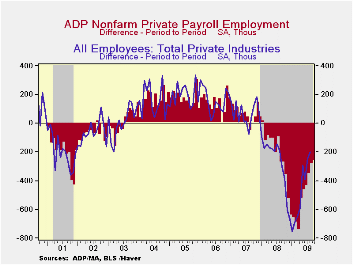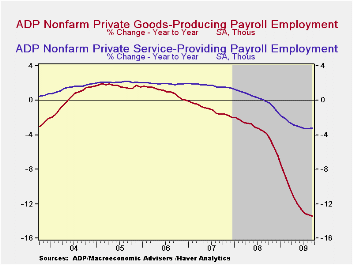 Global| Sep 30 2009
Global| Sep 30 2009ADP Report: Sharp Decline In Nonfarm Payroll Employment Continues
by:Tom Moeller
|in:Economy in Brief
Summary
The sharp decline in payroll employment continued this month, but the rate of decline recently has stabilized. The latest report from the payroll processor ADP, in their National Employment Report, indicated that private nonfarm [...]

 ADP reported that small-sized payrolls again fell the most this month and posted a 100,000 decline (-4.4%). That was similar to the 93,000 (-5.7% y/y) decline in medium-sized payrolls. Large payrolls fell by 61,000 (-5.7% y/y). The steady decline in service-producing industry employment continued. The September drop, which measured 103,000 (-3.2% y/y), was the eighteenth consecutive monthly decline but in percentage terms the three-month rate of change moderated to -1.8%. The recent declines are less than two-thirds the worst from December through March. Medium-sized service payrolls fell 38,000 (-3.6% y/y) and small-sized payrolls declined 38,000 (-2.9% y/y). Large service producing payrolls dropped by 27,000 (-3.5% y/y).
In the goods producing sector there were 151,000 fewer jobs in September (-13.4% y/y). Here, the three-month rate of change eased again but only to -9.6% versus -17.3% at its worst. Small-sized payrolls fell 62,000 (-13.1% y/y) followed by a 55,000 (-13.7% y/y) drop in medium-sized payrolls. Large payrolls fell 34,000 (-13.4% y/y). In the manufacturing sector alone, payrolls fell a steady 74,000 (-12.8% y/y).
The ADP National Employment Report data is maintained in Haver's USECON database; historical figures date back to December 2000. The figures in this report cover only private sector jobs and exclude employment in the public sector, which rose an average 11,083 during the last twelve months.
ADP reported that small-sized payrolls again fell the most this month and posted a 100,000 decline (-4.4%). That was similar to the 93,000 (-5.7% y/y) decline in medium-sized payrolls. Large payrolls fell by 61,000 (-5.7% y/y). The steady decline in service-producing industry employment continued. The September drop, which measured 103,000 (-3.2% y/y), was the eighteenth consecutive monthly decline but in percentage terms the three-month rate of change moderated to -1.8%. The recent declines are less than two-thirds the worst from December through March. Medium-sized service payrolls fell 38,000 (-3.6% y/y) and small-sized payrolls declined 38,000 (-2.9% y/y). Large service producing payrolls dropped by 27,000 (-3.5% y/y).
In the goods producing sector there were 151,000 fewer jobs in September (-13.4% y/y). Here, the three-month rate of change eased again but only to -9.6% versus -17.3% at its worst. Small-sized payrolls fell 62,000 (-13.1% y/y) followed by a 55,000 (-13.7% y/y) drop in medium-sized payrolls. Large payrolls fell 34,000 (-13.4% y/y). In the manufacturing sector alone, payrolls fell a steady 74,000 (-12.8% y/y).
The ADP National Employment Report data is maintained in Haver's USECON database; historical figures date back to December 2000. The figures in this report cover only private sector jobs and exclude employment in the public sector, which rose an average 11,083 during the last twelve months.The full ADP National Employment Report can be found here and the ADP methodology is explained here.
| LAXEPA@USECON | September | August | Y/Y | 2008 | 2007 | 2006 |
|---|---|---|---|---|---|---|
| Total Nonfarm Private Payroll Employment (m/m Chg., 000s) | -254 | -277 | -5.1% | -0.5% | 1.2% | 2.0% |
| Small Payroll (1-49) | -100 | -114 | -4.4 | -0.0 | 1.6 | 2.2 |
| Medium Payroll (50-499) | -93 | -106 | -5.7 | -0.5 | 1.2 | 1.9 |
| Large Payroll (>500) | -61 | -57 | -5.7 | -1.6 | -0.1 | 0.4 |
Tom Moeller
AuthorMore in Author Profile »Prior to joining Haver Analytics in 2000, Mr. Moeller worked as the Economist at Chancellor Capital Management from 1985 to 1999. There, he developed comprehensive economic forecasts and interpreted economic data for equity and fixed income portfolio managers. Also at Chancellor, Mr. Moeller worked as an equity analyst and was responsible for researching and rating companies in the economically sensitive automobile and housing industries for investment in Chancellor’s equity portfolio. Prior to joining Chancellor, Mr. Moeller was an Economist at Citibank from 1979 to 1984. He also analyzed pricing behavior in the metals industry for the Council on Wage and Price Stability in Washington, D.C. In 1999, Mr. Moeller received the award for most accurate forecast from the Forecasters' Club of New York. From 1990 to 1992 he was President of the New York Association for Business Economists. Mr. Moeller earned an M.B.A. in Finance from Fordham University, where he graduated in 1987. He holds a Bachelor of Arts in Economics from George Washington University.
More Economy in Brief
 Global| Feb 05 2026
Global| Feb 05 2026Charts of the Week: Balanced Policy, Resilient Data and AI Narratives
by:Andrew Cates






